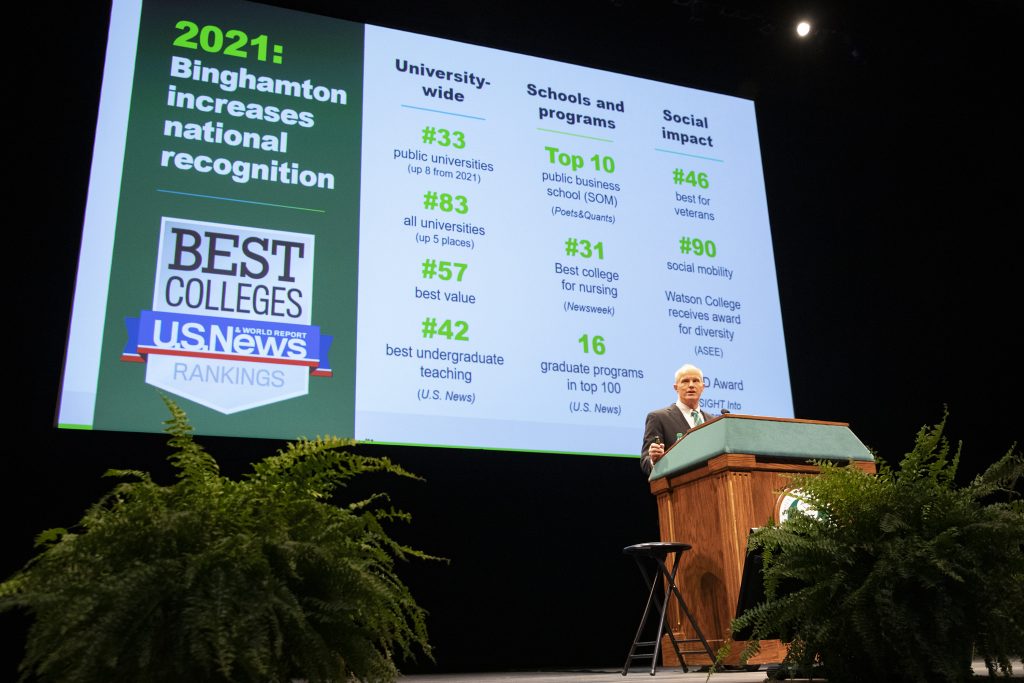On Tuesday, Binghamton University President Harvey Stenger returned to the Anderson Center’s Osterhout Concert Theater to deliver his annual State of the University Address.
Stenger addressed challenges as well as improvements to the campus, with news such as BU’s jump in rankings to the University’s increased efforts to support students who have been through a traumatic event or prejudice. Stenger also highlighted the renewal of his previously used model called “the roadway to success,” which he described as the efforts and actions being put toward the betterment of BU by not only him, but also teams of faculty members, alumni and community members. Stenger also said the University has teams of people working on a design for a new school of the arts program.
Stenger spoke about what BU has done to address COVID-19 on campus and how it plans to continue handling the pandemic.
“Returning to normal is always something that seems to be slightly out of reach,” Stenger said. “But I do feel like the fact that we are in person almost 100 percent with classes and meetings means that we are at the point where at least we have accepted students will be wearing masks, faculty will be wearing masks and we understand the risks. And if we are careful with how we manage our health, we can be the major form of prevention.”
Stenger mentioned in his speech about the honors BU received over the past year, such as being ranked the number 33 public university in the United States and getting the 2021 Higher Education Excellence in Diversity (HEED) Award. Along with the honors, he spoke on the new programs being worked on, including occupational therapy, physical therapy and speech and language pathology programs launching in 2023 and 2024, respectively.
Stenger continued his discussion on the projects for newly admitted students by talking about the recent addition of academic assessment days, which provide resources to students seeking academic support, that BU hopes to continue doing in the future.
“This idea came out of our ‘Road Map [to Premier]’ from last spring,” Stenger said. “We created some of these short courses over the summer that were online just to refresh new students and to see if they are calibrated well for academics at BU. The early assessment days presented themselves in the first month of classes in the forms of tests, quizzes and papers. These assignments were used to identify hundreds of students who were falling behind and were able to get help immediately before it was too late.”
Stenger spoke about BU’s next “Road Map to Premier” campaign, which has a focus on encouraging student success not just in the classroom, but also in other high-impact learning situations like studying abroad, research opportunities and internships. This campaign, along with more information, is set to release on April 9.
Stenger also listed initiatives taken by the Campus Citizens Review Board (CCRB) — a board put in place with the intent to develop trust and promote communication between students and Binghamton’s New York State University Police (UPD) — including the decision that all members of UPD are required to wear body cameras starting in fall 2022. He also talked about the opening of the Harriet Tubman Center for the Study of Freedom and Equity last September.
“The idea here was really to understand the concept around reconciliation,” Stenger said. “To create programs and do research and to actually create a physical center on campus in the old [Decker College of Nursing and Health Sciences] space, where faculty could meet and have conversations about this important topic and meet with students. Recommendations have come from commissions formed with the intention of addressing these social justice issues and it is an ongoing process.”
Stenger concluded by discussing recent updates to the campus, such as the new baseball field, Hinman Dining Center and the remodeling work on Science II and Science IV, creating new labs and lounge areas. He also discussed updates that are currently in the works, such as a welcome center being added to campus and the ideas beginning to evolve around new updates for the fine arts department.
“There are 400,000 square feet in the buildings that are associated with the fine arts,” Stenger said. “But they are actually like pieces of a puzzle that just do not fit very well together. So a team has been put together to design a school of the arts. Synergies could be improved if we could improve the space that we already have.”
Brianna Foster, a junior majoring in psychology, spoke on her thoughts on BU’s improvements in ranking.
“It’s nice to hear about all the ways [BU] is planning to improve,” Foster said. “And that it continues to hold its spot as a highly ranked university.”
Luisa Urgiles, an undeclared freshman, said she thought Stenger’s address included important updates in diversity.
“It is good to hear how our school goals are being reached,” Urgiles said. “Especially as a minority student, I liked how BU has been focusing on improving diversity and providing opportunities for students to expand their knowledge. I also am glad to hear about the help the school provides to students in need and the renovations to the different facilities at school, such as possible renovations in the fine arts department.”



